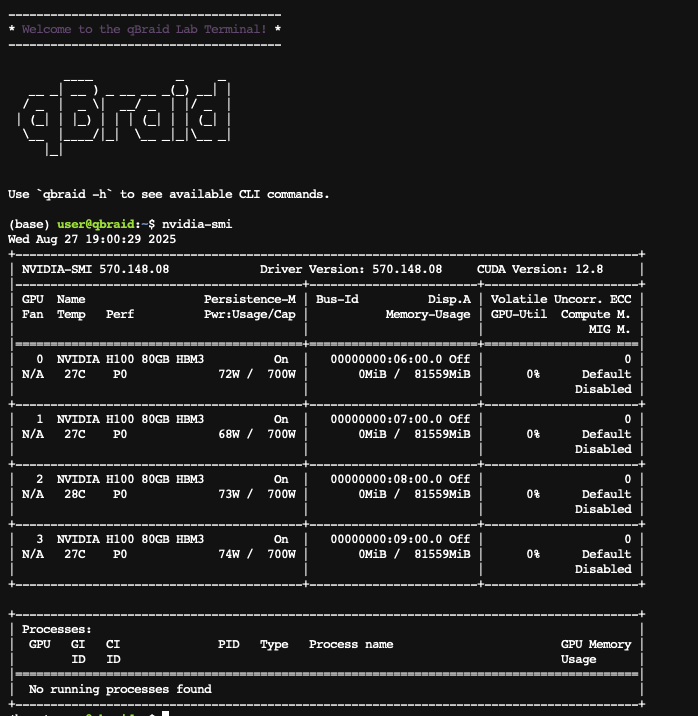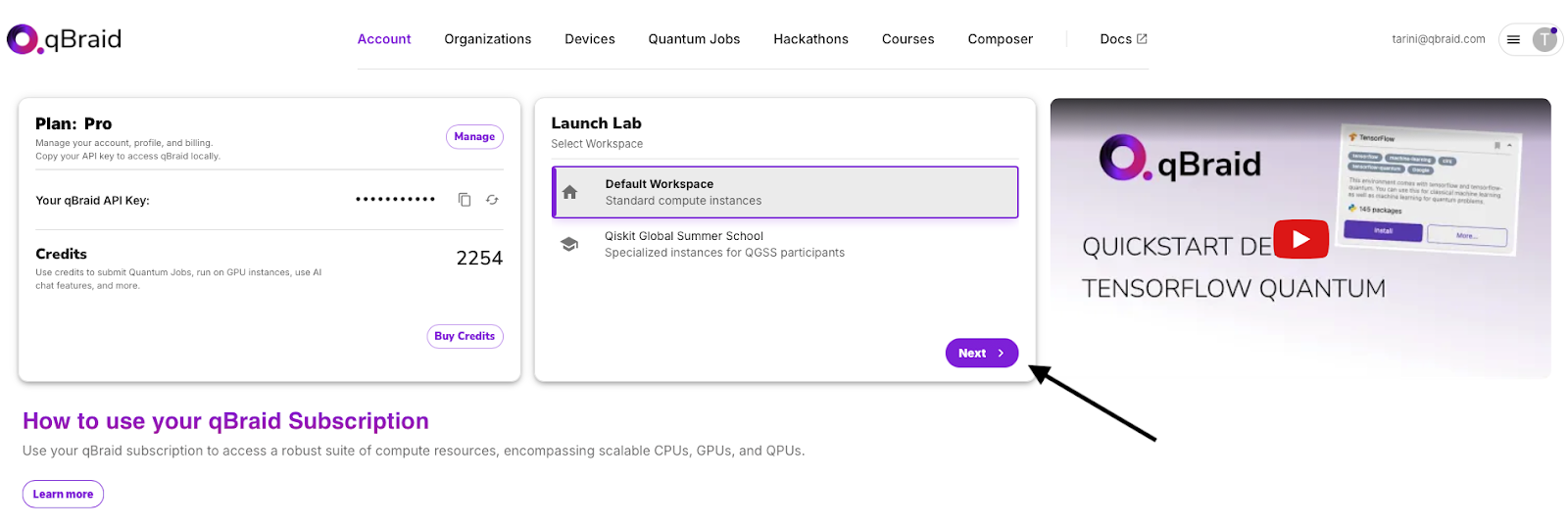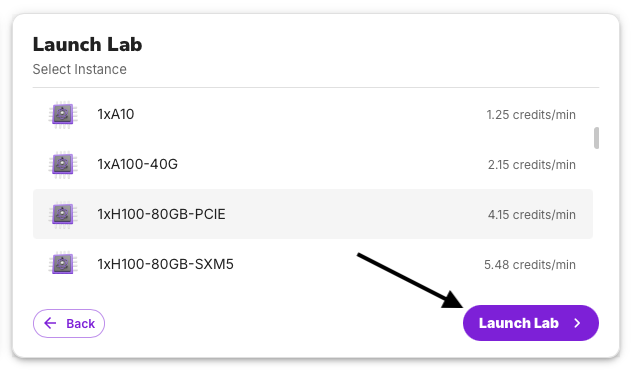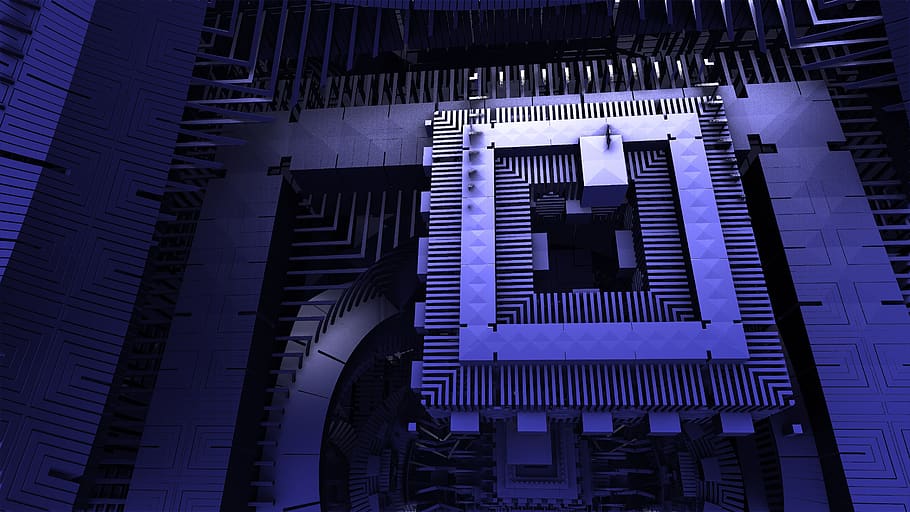Hiring
6
Min read
qBraid hires Dr. Junyu Liu as QML researcher

Contents:
You can supercharge your workflows by running GPU-accelerated jobs directly in qBraid Lab. Whether you’re training quantum-inspired models, simulating larger circuits, or experimenting with hybrid AI + quantum approaches, GPUs unlock a whole new level of performance.
✨ Check out our step-by-step guide to launching GPU instances on Lab, or skip to the video!
🏆 Sign up for the qBraid 2025 GPU4Quantum Challenge to get early access, test creative use cases, and compete for prizes and credits.
This is your chance to be among the first to explore what’s possible when quantum meets GPU power.



6. Don’t forget to stop the instance by returning to account.qbraid.com and clicking on the “Stop” button.
At the end of the early access, we’ll ask for your feedback — and in the meantime, feel free to reach out anytime at contact@qbraid.com if you run into issues or have suggestions.
- Wide GPU access: V100, A100, H100, GH200, and B200 class GPUs, available in various configurations. Billing is in credits/minute with rates shown in your account launcher.
- Preconfigured Python environment: Activate the default environment by running qbraid envs activate default in a terminal or simply open a notebook and make sure the 'default' kernel is selected. This environment includes GPU-optimized versions of
- Cluster scaling: Scale up to 1536× B200 GPUs or 512× H100 GPUs. Contact us at contact@qbraid.com to enable large-scale clusters.
- Different filesystem: GPU sessions use a separate filesystem from standard qBraid instances, so your existing qBraid files won’t appear here. Files saved in GPU sessions _do persist_ and benefit from a higher-performance storage backend.
- Occasional NVIDIA setup issues: After starting a GPU, run nvidia-smi in a terminal session. If you see an error, restart the same instance. We’re actively working to resolve this.
- Environment Manager limitations: The pre-packaged environments from standard qBraid aren’t yet available here. You can still create and persist local environments, but they are not shareable (yet).
- Capacity constraints: GPUs are in high demand! Sometimes capacity may be temporarily unavailable. Refresh periodically and capacity should free up. We’re continuously adding more GPU resources to reduce this issue.
- Slow startups: GPUs may take up to 15 minutes to start. Feel free to grab a coffee and come back! Don’t worry, you will not be charged for the startup-time!

Hiring
6
Min read
qBraid hires Dr. Junyu Liu as QML researcher

Hackathons
10
Min read
From October 21st to November 5th of 2022, qBraid hosted HAQS, one of the most popular quantum computing events of the year, where participants from around the world worked on solving a total of five quantum computing challenges during the two weeks of the event.

Product
1
Min read
Intel® Quantum SDK is generally available on qBraid Lab for Free with no installation necessary

Collaborations
3 minutes
Min read
qBraid has been selected by IBM to host their annual Qiskit Global Summer School for the second year in a row.

Collaborations
5
Min read
As an early adopter of the NVIDIA GH200 Grace Hopper Superchip systems, qBraid provides unparalleled access to today’s most advanced computing technologies.

Collaborations
1
Min read
Explore the advantages of cloud-based quantum computing and how it is revolutionizing research and development across various industries

Collaborations
1
Min read
Discover how quantum computing is revolutionizing enterprises, from enhancing cybersecurity with quantum encryption to optimizing complex logistics and supply chain operations.

Collaborations
5
Min read
qBraid’s quantum computing platform adds access to 256 qubit neutral atom quantum computer, Aquila by QuEra.

Collaborations
5
Min read
qBraid and Quantum Algorithms Institute partner to accelerate the pace of quantum computing in British Columbia and beyond.

Collaborations
4
Min read
The qBraid platform will allow users to play with Pulser in a matter of a few minutes.

Hackathons
5
Min read
As part of QHack, qBraid is providing the best quantum developer notebook environment experience for challengers.

Hackathons
10
Min read
From October 21st to November 5th of 2022, qBraid hosted HAQS, one of the most popular quantum computing events of the year, where participants from around the world worked on solving a total of five quantum computing challenges during the two weeks of the event.

Hackathons
5
Min read
At this year's QCHack, participants attended a week filled with amazing talks, 1:1 sessions with academic and industry mentors, and a 24 hour hackathon hosted by Stanford, Yale and Berkeley.
-min.jpeg)
Hackathons
4
Min read
The potential of the field of quantum computing is so huge that everyone in the field cannot wait for all the promises that the field holds to become a reality.

Research
5
Min read
IEEE has awarded qBraid and its collaborators 1st place for the Best Paper Award in the Quantum Algorithm Track.

Research
1
Min read
qBraid's team used hybrid classical-quantum algorithms to determine the best flight path

Research
1
Min read
Learn how classical sampling methods, such as Markov Chain Monte Carlo, can estimate truncation errors in simulating bosons on quantum computers, aiding resource assessment and result validation for quantum simulations, including applications in two-dimensional lattice scalar field theory.

Press Releases
2
Min read
qBraid wins NSF POSE grant to build open source ecosystem

Press Releases
10
Min read
qBraid and NVIDIA CUDA-Q are removing the two biggest blockers to AI4Quantum research

Press Releases
8
Min read
Our first cohort of the qBraid Alliance, a partnership with student organizations at leading universities around the country.

Press Releases
5
Min read
Coming from IBM Quantum Lab? Learn how to start using qBraid Lab

Press Releases
10
Min read
The Bloch develops quantum technology solutions for society’s most pressing problems by accelerating industry adoption to drive research commercialization, catapulting US leadership in quantum information science and technology.

Press Releases
5
Min read
Our newest podcast series

Press Releases
5
Min read
qBraid will lead a team of researchers from MIT, UChicago, Argonne National Laboratory, and QuEra to develop quantum computing solutions for studying the interaction of metals and intrinsically disordered proteins.

Press Releases
Min read
OSU uses qBraid for accessing Intel Quantum SDK

Press Releases
5
Min read
qBraid provides agnostic connections to quantum computers and simulators thanks to Amazon Braket

Press Releases
10
Min read
Duality Quantum Accelerator Accepts Six Startups into Inaugural Cohort

Press Releases
1
Min read
Take the QuBes (Quantum Beginners) course to learn quantum computing.

Press Releases
5
Min read
qBraid aims to increase accessibility to, and interoperability amongst, quantum computing resources.

Product
3 minutes
Min read
Supercharge your quantum workflows with GPUs on qBraid
.png)
Product
5
Min read
We are pleased to have presented qBraid’s Platform-Agnostic Open-Source Tools at the Quantum Computing Devroom in FOSDEM 2025.

Product
5
Min read
Accelerating hybrid workflows using Pennylane's embedded simulators with NVIDIA GPUs on qBraid Lab.

Product
5
Min read
Here are 3 ways to install python packages on qBraid

Product
2
Min read
How to install Cirq v1.2.0 environment on qBraid Lab

Product
1
Min read
Let qBraid help you take your first step into the quantum world!

Product
1
Min read
Intel® Quantum SDK is generally available on qBraid Lab for Free with no installation necessary

Product
1
Min read
Dive into the intricate interplay of the Bernoulli line and the Bloch sphere, revealing profound geometric insights into quantum state dynamics.